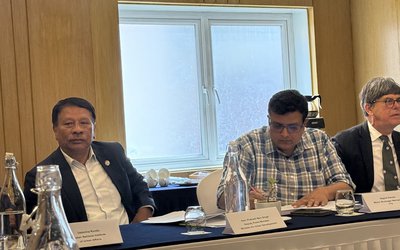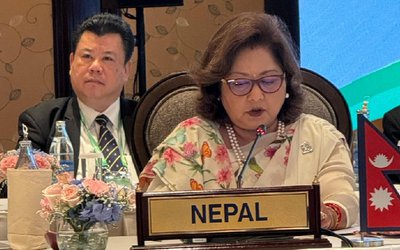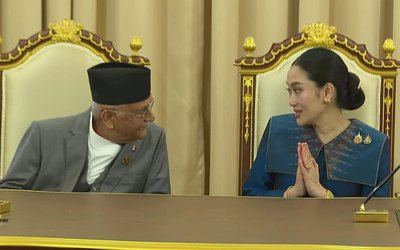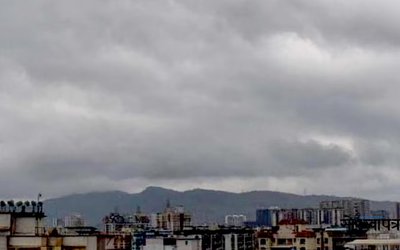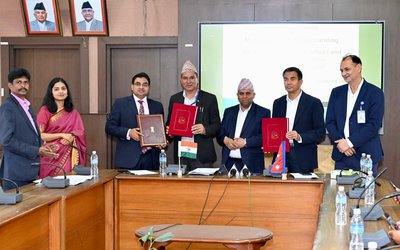The world is on the verge of a Third World War. The former US Secretary of State, Henry Kissinger believes that the US is on the brink of war with Russia and China. Kissinger is a war strategist and controversial Nobel Peace Prize Laureate, who during summer 2022 was advocating that Ukraine should initiate negotiations with Russia even at the cost of ceding territories captured by the Russians. Kissinger has recently said that Russia has already lost the war. And, yet he is suggesting to tackle Putin diligently, including the possible use of nuclear weapons. John Mearsheimer, who is offensive realist, is alarming the danger of nuclear war.
In reality, the Russian invasion of Ukraine has turned into direct war between the North Atlantic Treaty Organization (NATO) and Russia. This is a war between two nuclear powers, the US and Russia, holding the most destructive weapons in the world. At the same time, China continues its deadly arm exercises around Taiwan. North and South Korea are firing missiles across the sea border, which is another US war in the Korean Peninsula. Even Iran is being dragged into the European war for allegedly selling drones to Russia.
In view of the war in Europe and the developing scenario of US-China war in Asia, three crucially interrelated issues, as I presume, arise for consideration by international jurists, statesman and strategic thinkers and they are: Is it reasonable to risk dangers of a Third World War in favor of the right to self-defense of Taiwan and Ukraine (and if yes, is the world community ready for that)? Is the ‘manufacturing of consent’ for war by the world press media legally and ethically reasonable? Why are Nobel Peace Prize laureates not speaking up for peace?
Prior to proceeding further it seems logical to talk about rules of ‘just war’, ‘offensive’ and ‘defensive’ acts of war. When jurists talk about ‘just war’, self-defense is a natural right of states which is acknowledged by the UN Charter. Except for self-defense, any foreign intervention, invasion and/or other forms of war are prohibited by the UN Charter. When viewed from these basic norms of international law, the Russian invasion of Ukraine is illegal as was the 2003 US invasion of Iraq, which was wedged on pretension that Iraq had weapons of mass destruction. Under the UN Charter, the five permanent members of the Security Council, UK, US, China, France and Russia, are responsible for maintaining international peace and security. In reality, the US and Russia have been disturbing international peace and security constantly. Overall, the growing global insecurity are causes and consequences of Security Council failures.
Russia is blatantly aggressive towards Ukraine, although Russia calls it a defensive war because of Ukraine being militarily supported by NATO member states. If and when China takes military action to unify Taiwan into the mainland, and whatever response the US will take to support Taiwan, it will be difficult to determine acts being offensive or defensive. Many experts compare the China-Taiwan and Russia-Ukraine situations with the 1962 Cuban Missile Crisis. The only difference between then and now is that now the crisis is at the doorsteps of Russia and China. Russian missiles then in Cuba were at the US doorstep.
Risking nuclear war
A clear and convincing reply to the first question is not easy to ascertain. Utilitarianist and realist strategists believe that ‘the end justifies the means’, also known as Machiavellian tactics which are equivalent to ‘Kautilya Niti’. In other words, it is about the security of the maximum number of people at the sacrifice of a few others. This also means if one state has the right to self-defense with nuclear weapons so has others, although all states are not in possession of such. The nuclear war, however, is such an extreme scenario where there is no guarantee of survival for anyone. Machiavellian tactics or ‘Kautilya Niti’, are not and should not be considered normal conduct of international relations.
War of mass destruction must be avoided by any means. Jeffrey Sachs made a telling comment at the Athens Democracy Forum 'Aristotle-Confucius Dialogue' on 28 September 2022. Sachs said that Ukraine's President Zelensky would be the most culpable, abstaining from talks, if nuclear war were to occur. Sachs also suggested that the world's major powers should talk instead of pointing fingers at others or demeaning opponents. The war, as Sachs suggests, should not be seen as a battle between democracy and authoritarianism. And, the US should not try to prove its model superior to another. I understand Sachs’ view as the transplantation of democracy by foreign forces has proved to be unsustainable. Sachs bluntly concludes that the current war in Ukraine was provoked by NATO by expanding itself into Russia's borders.
With regard to the Taiwan situation, Kevin Rudd (‘The Avoidable War’, 2022) writes, ‘a war between China and the US would be deadly and destructive’. China and the US geopolitical crisis is still avoidable, says Rudd, suggesting that both countries must find ‘a way to co-exist without betraying their core interests through strategic competition’.
Manufacturing of consent
As to the second question, Edward Harman and Noam Chomsky's ‘Manufacturing consent’ has become a reality creating consent for wars. With a few honorable exceptions most of the Western media are legitimizing the wars. Manufacturing of consent for war is illegal as well as immoral and inhumane. The UN General Assembly, at its one hundred and eighth Plenary Session (November 3, 1947), adopted a resolution requiring Member States to take action against propaganda for war and incitement to war. Prohibition of propaganda for war is a key provision outlined in the International Covenant on Civil and Political Rights. It is not an unreasonable restriction on the right to freedom of expression. Both sides of the Russia-Ukraine war are promoting their own facts and myths. As we know, truth is the first casualty of any war.
Silence of Nobel Peace Prize laureates
Finally, why are the world’s Nobel Peace Prize laureates not speaking up for peace? ‘The 2022 Peace Prize is awarded to human rights advocate Ales Bialiatski from Belarus, the Russian human rights organization Memorial and the Ukrainian human rights organization Center for Civil Liberties’. But these Nobel laureates are keeping silent concerning the war in Europe. China's Liu Xiaobo was awarded the 2017 Nobel Peace Prize. The Dalai Lama was awarded the 1989 Nobel Peace Prize. No authoritative comment has come to the public from these Nobel laureates. The Dalai Lama is known as the man of peace and his advocacy for peace in Asia is more needed now than ever.
It should be acknowledged that the Nobel Peace Prize itself has not been free from controversy. Accusations include ‘Nobel Peace Prize is politically motivated, premature, or guided by an incorrect definition of what constitutes peace.’ Mahatma Gandhi was never awarded the prize. Jean-Paul Sartre refused to accept the 1964 literary prize. George Bernard Shaw, who accepted the 1925 Nobel Prize in literature, but refused to accept prize money, tells the truth (in 'The Man of Destiny') about preaching peace in disguise for war, i.e., 'English man, as the great champion of national freedom conquers and annexes half the world and calls it colonization. When he wants a new market for his Manchester goods, he sends a missionary to preach peace'.
When the Nobel Prize was established Norway and Sweden were one country. As Alfred Nobel wished, the ‘Peace Prize’ is awarded in Norway and the other prizes in Sweden. Norway has been a member of NATO since 1949. Sweden has recently applied for NATO membership. NATO was created in opposition to the Soviet-backed Warsaw Pact. NATO continued even when Warsaw Pact, along with the Soviet Union, dissolved in 1991. The ghost of the Warsaw military pact seems to be haunting Russia and Europe.
The answers to the three questions may be summarized as follows. The most powerful countries in the world are run by elected or unelected autocrats. The world is under threat of nuclear weapons, but nuclear war must be avoided at all costs. Media must stop building consensus for war, rather creating environment for peace and for citizens being able to question the power. Today Bertrand Russell and Jean-Paul Sartre are no longer speaking for peace and disarmament. Noam Chomsky has been calling for peace since the start of the Russia-Ukraine war. Jeffrey Sachs and Kevin Rudd are imparting useful knowledge. The voice of peace is becoming more important than ever.
Dr. Malla is a Senior Fellow at the Stockholm Centre for International Law and Justice, Stockholm University.

Katak Malla
LLD, Stockholm University
- Where Is Money For The Climate Loss And Damagefund?
- Dec 30, 2022
- Sweden’s Neutrality Is Gone, Nepal’s non-Alignment Must Stay
- Jun 18, 2022
- Nepal’s Foreign Policy In Times Of Change And Uncertainty
- Jul 08, 2020
- Covid-19 And Alert Information In The Digital Age
- Apr 09, 2020
- Political Leaders Need Pubic Trust, Dealing With Covid-19
- Mar 26, 2020




